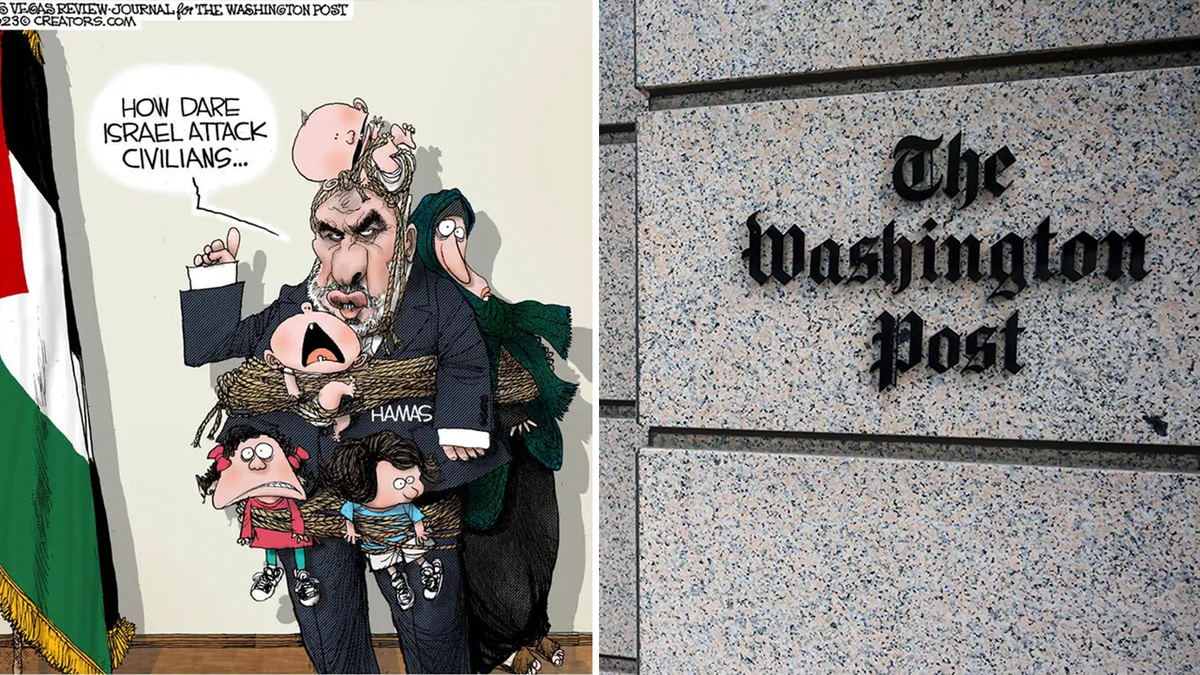Hamas stole our children, and we want them back: Tal Heinrich
Tal Heinrich, spokesperson for Israeli Prime Minister Netanyahu, discusses efforts to free hostages taken by Hamas and comments on the ground fight in Gaza.
Conservative criticism is mounting against The Washington Post for pulling an anti-Hamas political cartoon after some staffers expressed "deep concerns" about the panel.
The cartoon by the Las Vegas Review-Journal's Michael Ramirez, who is also published in the Post twice a week, was titled "Human shields" and depicted a Hamas spokesperson saying, "How dare Israel attack civilians," while a frightened-looking woman and four children are bound with rope to his body.
The cartoon was featured in the Nov. 8 print edition of the paper and online, which was later deleted after backlash, both internally and externally.
WASHINGTON POST PULLED ANTI-HAMAS POLITICAL CARTOON AMID 'DEEP CONCERNS' FROM STAFFERS

Criticism is mounting against The Washington Post after it pulled an anti-Hamas political concern after some staffers expressed "deep concerns" about the panel. (Michael P. Ramirez/Getty)
"There was both external criticism and internal criticism. I think a number of people inside and outside were offended by the caricature, both of the man and the woman. I’m not sure, however, if the message itself [criticizing Hamas] was the problem," one Washington Post insider told Fox News Digital.
The deletion and The Post's subsequent apology angered some conservative political commentators online, who bashed the outlet for refusing to stand by the cartoon.
"Let the word go forth, for the woke have spoken: terrorist groups using human shields is not problematic," political consultant Noah Pollak wrote in a post on X. "But making fun of terrorist groups using human shields is deeply problematic."
"Kind of surprised the Washington Post pulled this cartoon, given that it's a completely accurate depiction of Hamas's tactics," The Bulwark's Sonny Bunch wrote on X.
Journalist Jeryl Bier wrote that he was not convinced of The Post's reasoning behind its apology. "I am skeptical that retracting a cartoon because some people complain is the ‘spirit of opinion journalism.’"

The New York Post Editorial Board told The Washington Post that the "apology is the mistake, not the publication" of the anti-Hamas cartoon. (Israel Defense Forces via AP)
The New York Post Editorial Board told the Washington Post that the "apology is the mistake, not the publication" of the anti-Hamas cartoon.
"This retreat simply encourages those objecting to a message," the New York Post editorial board wrote, "to cry ‘Racism’ so as to censor" speech that the political left doesn't agree with.
"Democracy dies in darkness' is the WaPo’s slogan; we’re saddened to see it surrendering to the dark side," the board continued.
WASHINGTON POST APOLOGIZES, REMOVES ANTI-HAMAS CARTOON AFTER CRITICS CALLED IT RACIST
The Washington Post's opinions editor David Shipley explained why he pulled it.
"As editor of the opinion section, I am responsible for what appears in its pages and on its screens. The section depends on my judgment," Shipley began. "A cartoon published by Michael Ramirez on the war in Gaza, a cartoon whose publication I approved, was seen by many readers as racist. This was not my intent. I saw the drawing as a caricature of a specific individual, the Hamas spokesperson, who celebrated the attacks on unarmed civilians in Israel."
"However, the reaction to the image convinced me that I had missed something profound, and divisive, and I regret that," Shipley continued. "Our section is aimed at finding commonalities, understanding the bonds that hold us together, even in the darkest times. In this spirit, we have taken down the drawing."
Buzbee's message to staff was first reported by the Washington Free Beacon.
CLICK HERE TO GET THE FOX NEWS APP
For more Culture, Media, Education, Opinion, and channel coverage, visit foxnews.com/media.
Fox News' Joseph A. Wulfsohn contributed to this report.
